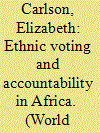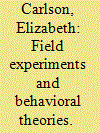|
|
|
Sort Order |
|
|
|
Items / Page
|
|
|
|
|
|
|
| Srl | Item |
| 1 |
ID:
138428


|
|
|
|
|
| Summary/Abstract |
The strong support that African presidents retain among voters of their own ethnicity, despite clear evidence of shirking and corruption, has prompted numerous empirical investigations into whether an incumbent's ethnicity or performance is more important to African voters. The model of vote choice underlying almost all of these studies is additive and implies that either coethnicity or good performance can increase a candidate's vote share. However, there is little theoretical justification for such a model. In the dominant theory of ethnic voting in Africa, coethnicity is a signal of better outcomes, indicating that ethnicity and performance are not separate considerations. Using an experiment that is designed to determine how Ugandan voters make choices, the author shows that the effects of coethnicity and good performance interact: neither attribute increases support for a candidate in the absence of the other. Though previous analyses indicate that, all else being equal, voters always prefer coethnics, this study demonstrates that coethnics only have an advantage when they are not shirkers. Additionally, though previous studies indicate that voters always prefer good performers, this analysis shows that voters are indifferent to the performance of non-coethnic candidates. The article provides evidence that this pattern is in fact a result of voters' beliefs that they will only receive future goods from coethnics, making a demonstrated ability to provide such goods relevant for the electability of coethnic candidates, but not for non-coethnics. Since a large number of African voters do not share the ethnicity of their incumbent, this finding has troubling implications for accountability of African leaders.
|
|
|
|
|
|
|
|
|
|
|
|
|
|
|
|
| 2 |
ID:
171284


|
|
|
|
|
| Summary/Abstract |
The design of field experiments makes them inappropriate for testing many common political theories. These theories propose that certain factors—for example, income or information—affect how individuals make choices. To test these theories, researchers typically investigate the correlation between the relevant factor and individuals’ choices, holding other factors constant. Field experiments, in contrast, allow multiple factors to vary at once: they create real-world disruption and do not control how actors behave in response. Subjects’ choices will be affected by the experimental treatment as well as by other changes that occur as the larger system reacts. It will be difficult to isolate the effect of any one factor, particularly without a good preexisting model of the system and how it is likely to respond. If a field experiment will not tell us what we need to know, the benefit of the study cannot outweigh harm, and it also will be unethical.
|
|
|
|
|
|
|
|
|
|
|
|
|
|
|
|
|
|
|
|
|